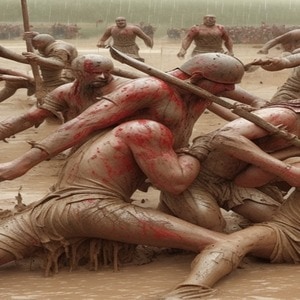Gilgamesh had to admire the ruthless cunning of the tactic. The enemy general had ensured the mutual destruction of both units, betting everything on a showdown with Gilgamesh himself.
That’s when Gilgamesh saw him gliding through the sheets of rain like a spectre, honed in with single-minded purpose. The enemy general drew the blade from the sheathe at his side. He too stood barefoot, in nothing more than a silken loincloth that draped to his knees. It was made of a finer fabric than Gilgamesh’s own, but the rain and mud and blood had saw to it that even this inequity was rectified.
The battlefield was a symphony of iron and agonized cries, yet it seemed the only thing that existed in this moment, was Gilgamesh and his enemy. They both advanced forward, swords drawn, until they were arms length apart. Then, they began to circle each other.
Anu’s general raised his left elbow and rested his blade upon it, poised like a serpent. Gilgamesh grimaced, gripping his own blade tightly. He had fell bigger, better-equipped men in worse circumstances. This would be no different.
Gilgamesh roared and hacked at the pale, lithe body of Anu’s general. He chose a sweeping, angled arc that was both difficult to block, and dodge. It was a technique he developed himself in the arena. It was great against smaller foes. Gilgamesh towered over most men at six and a half feet tall, and was a mountain of muscle and long limbs. If his enemy blocked the attack, Gilgamesh would strike again and again, overpowering them with brute force until they fell over or missed a crucial block.
If they tried to dodge the strike, half of them would fail because they would misjudge the angle of the attack. The other half would put themselves in a poor position, losing ground. It was only a matter of time before they made an error, and Gilgamesh’s blade would find purchase, as it so often did.
Anu’s general ducked the strike with an almost absent-minded weave. In only a moment, he contorted his body at an angle of peak efficiency, only moving as much as he had to in order to avoid the strike. In the same fluid motion, he slashed at Gilgamesh.
The searing fire of rent flesh made Gilgamesh jump back. He ran his hand down his abdomen and it returned scarlet red. He had been hit. It was only a glancing wound, no internal organs pierced, but Gilgamesh had never felt the sting of a blade before. In truth, he was a little surprised he could bleed at all.
Anu’s general had returned his blade to resting on his elbow, circling Gilgamesh in an almost imperceptible spiral, inching ever closer. Gilgamesh realized that his foe was taking a defensive stance, waiting for Gilgamesh to make another mistake. He was trying to use Gilgamesh’s confidence against him. This was certainly no ordinary enemy.
Gilgamesh thrust his sword forward, this time, holding back, testing his enemy’s reaction. Anu’s general batted the strike to the side, then leapt into the air, twirling like a dancer, coming down with his own blade in the same sweeping arc Gilgamesh had used only a moment earlier.
The movement was so swift and fluid, with no fear or hesitation, the only reaction Gilgamesh could manage was to offer up his own blade to block it. This only worked because he had himself, not followed through with his own attack.
The blade of Anu’s general came down with such force that it cleaved Gilgamesh’s sword in two, and even bit into his flesh on the way down, causing Gilgamesh to tumble backwards.
Gilgamesh plummeted with a splash into a mud pit, a deep gash in his right cheek that shattered his jaw and several teeth. Anu’s general did not waste a moment, he descended on Gilgamesh even as he was falling, blade thrusting forward for the killing blow.
The blade was angled expertly. There was truly no escape from it. Death had finally come to claim Gilgamesh. He could rest now. As the blade entered his body, his life began to play out before him. He remembered playing in the fields as a boy, his father scolding him because he spent more time pretending wooden sticks were swords than tending to the barley.
And he read. Commoners weren’t typically educated, but Gilgamesh was never satisfied sowing seeds. He frequently snuck off from his duties to learn. Gilgamesh accomplished this by posing as a rich merchant’s son.
He had caught the merchant’s son bathing in the Euphrates with one of his classmates, and because no women received a formal education in Sumer, Gilgamesh struck a deal. He would keep the boy’s secret if he allowed him to attend school in his stead.
The merchant’s son eagerly agreed. Of course, the little scheme didn’t last very long. The teachers eventually caught on when the merchant complained that his son had not yet learned cuneiform.
Gilgamesh and the merchant’s son both got in a lot of trouble for that. Fortunately for Gilgamesh, during that time he had managed to build a rapport with some of the temple priests that taught reading and writing.
Overjoyed that a child would take initiative to read on his own, the temple priests told Gilgamesh he could come any time and read all the tablets he wanted to his heart’s content, so long as he put them back unscathed, and didn’t disrupt any temple activity in the process.
Gilgamesh did just that, reading anything he could get his hands on, from stories of the old kings, like Enmerkar and the Aratta expedition, to poems and epics. He read military campaigns, tales of sorcerors outsmarting kings and gods alike. He even read the tedious tablets, such as grain and sheep tallies.
The priests thought it was odd that Gilgamesh would read books that only served as accounting references, but through them, Gilgamesh learned how much grain and sheep, weapons and water would be needed to furnish an army of a certain number of men.
Gilgamesh spent most of his childhood preparing, building his mind and body up for the great future he envisioned. He learned to sow and tend crops from his foster father, then he learned how to count them from the temple priests.
They also taught him about civics. Gilgamesh learned how civilization operated, as well as the people within them. He learned that wealth was acquired by usefulness. The more knowledge you had, the more useful you were. The more useful you were, the more valuable you became. The more valuable you became, the more powerful you became. Or, at least, that is what he thought in his youth, before the eventful day that it all came crashing down.
That day was emblazoned in Gilgamesh’s memory. He was returning home from the temple, smiling from ear-to-ear because he had just spent the afternoon making love to a beautiful and brilliant apprentice priestess named Sabit. He had done it quite frequently lately, and it had only cost a couple of his father’s tin coins every now and then.
The smile faded fast when Gilgamesh saw the contingent of soldiers standing outside of his foster father’s door, in the midst of a heated argument.
“Please. Just give me a little more time. Next harvest I will be able to make burden payments. I had the tin for it, I swear, I don’t know where it has gone,” Gilgamesh heard his foster father say.
The lead soldier shook his head. “I am sorry Apiyatum. I have orders from King Enmerkar. Collect your debt by any means necessary.”
And so Apiyatum did. He gave them Gilgamesh, sold his own son into slavery to pay off his debt.
Though Gilgamesh’s internment as a slave was meant to end in only a few months, it seemed he would be freed now to the nether instead. He had only just remembered that it was he who had stolen the tin to pay for the pleasures of the priestess, he who had neglected his farming duties. He had always blamed his foster father’s weakness for his enslavement, but all this time it had been his own fault.
No, it was not him that failed fate, but fate that failed him. He was not meant to be a pauper. He was a king. He would accept no lesser life, and the gods should have known this.
Instead, Gilgamesh would die nameless in the mud, just another slave that shit themselves under the shadow of the spectre of death. He would not, however, do it alone. Though his wrist was shattered, through sheer force of will, he gripped his broken blade and buried it to the hilt into his enemy’s startled eye, right in the center of Anu’s horned crown crest. Then, he died.










Comments (0)
See all